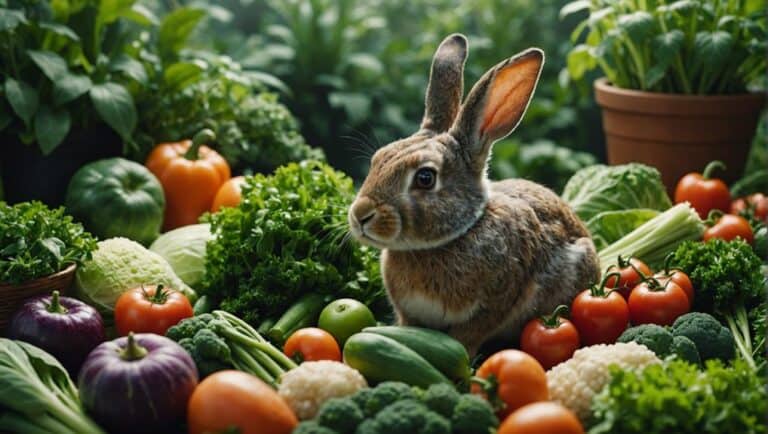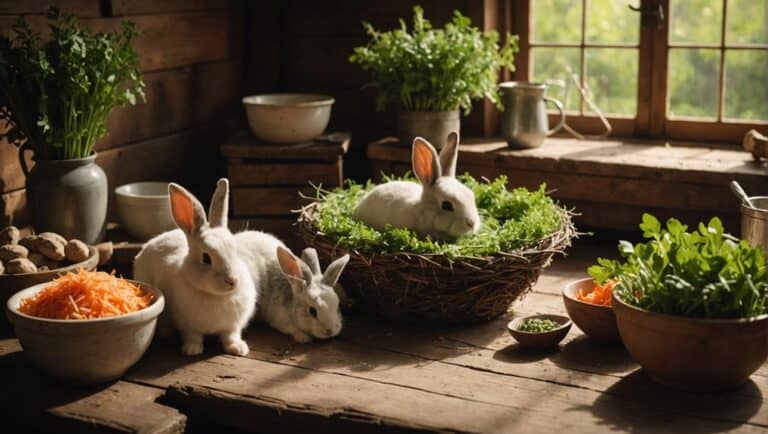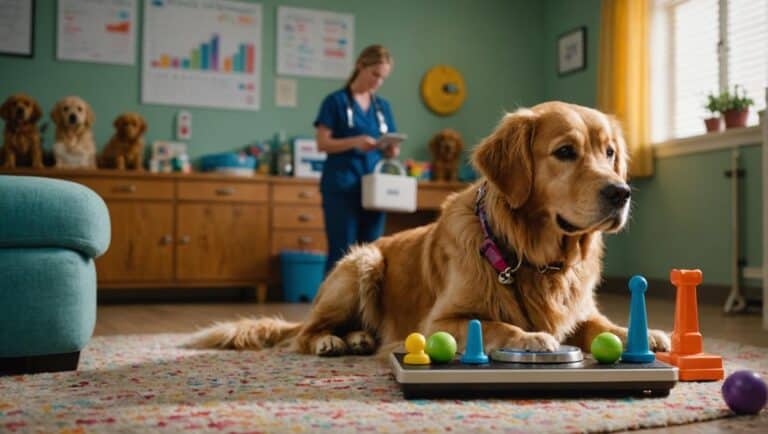Imagine a well-tended garden, where each plant thrives on the right mix of sunlight, water, and nutrients; similarly, your senior rabbit needs a carefully balanced diet to flourish in its golden years. As age brings changes, understanding the dietary essentials becomes critical for maintaining their health and vitality. You might wonder what specific changes you should make to their meals or how to guarantee they're getting the right nutrients. Let's explore the essential components of a senior rabbit's diet that can help them age gracefully and healthily.
Contents
Nutritional Overview for Seniors
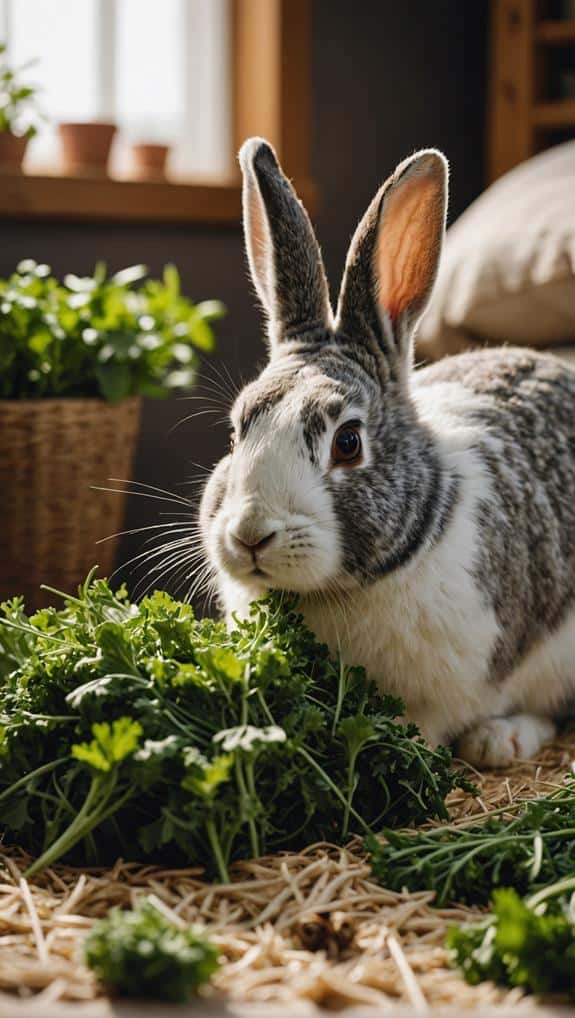
Understanding the unique dietary needs of senior rabbits is vital for their health and well-being. For senior rabbits, defined as those over 7 years old, a high-fiber diet is essential. Hay should form the bulk of their diet, as it supports both digestive and dental health.
A tailored diet is important for peak health and longevity in senior rabbits, with an emphasis on low-protein, high-fiber diets, so incorporating various types of hay can provide diverse nutrients and keep them engaged with their food. Fresh vegetables, particularly leafy greens like kale and romaine, offer important nutrients but should be introduced gradually to monitor tolerance.
Avoid root vegetables and fruits due to their high sugar content fresh veggies provide essential nutrients.
In addition to hay and vegetables, quality pellets like Oxbow's "Senior Essentials" are formulated specifically for senior rabbits. These pellets provide targeted protein and high fiber, supporting muscle maintenance and overall health.
It's important to control portions to prevent obesity, which can exacerbate health issues.
Hydration is another key aspect of a senior rabbit's diet. Make sure they've continuous access to fresh, clean water, and consider incorporating wet greens to help with fluid intake, especially as senior rabbits face a higher risk of kidney disease.
Breed-Specific Dietary Needs
When considering your senior rabbit's diet, it's essential to recognize that different breeds have unique nutritional requirements.
Larger breeds, like Flemish Giants, need more calories due to their size and activity level, while smaller breeds, such as Holland Lops, may require softer hays to support dental health.
Additionally, as rabbits age, they may also develop specific health issues that can influence their dietary needs, such as common health concerns related to dental problems and gastrointestinal health.
Understanding these breed-specific needs will help you adjust their diet effectively, ensuring ideal health and well-being.
Breed-Specific Nutritional Requirements
Different rabbit breeds come with their own unique dietary requirements, greatly impacting their health and well-being as they age. For instance, larger breeds like Flemish Giants have higher caloric needs to sustain muscle mass, while smaller breeds such as Netherland Dwarfs require fewer calories.
It's essential to monitor these caloric needs to prevent obesity, particularly in breeds like the English Lop, which may need a lower-calorie diet complemented by increased exercise. Additionally, understanding common health issues related to diet and nutrition in bunnies can help tailor their feeding plans effectively.
Additionally, certain breeds face specific dental issues. For example, Lionheads and Angoras may benefit from softer diets with increased fiber content to aid in chewing and digestion.
Breeds like Dutch and Havana rabbits, often prone to muscle loss, demand higher protein requirements to maintain their health.
Understanding these breed-specific nutritional needs allows you to develop tailored nutritional plans. Regular veterinary consultations are vital, as they help adjust diets based on individual health conditions and breed characteristics.
This proactive approach guarantees your senior rabbit receives ideal nutrition, supporting their aging digestive system and overall well-being. Prioritizing these breed-specific requirements can markedly enhance the quality of life for your beloved companion. Additionally, incorporating appropriate dietary adjustments and regular veterinary check-ups can help detect potential health issues early, ensuring your rabbit maintains a vibrant and active lifestyle. Understanding the specific health needs of your senior rabbit can also contribute to achieving a longer and healthier life span of white rabbits, as well as other breeds. By tailoring their care, you can create a nurturing environment that promotes happiness and longevity in your cherished pet.
Adjusting Diet for Breeds
Adjusting your senior rabbit's diet according to their breed-specific needs can considerably enhance their health and longevity. Different breeds have unique dietary requirements; for instance, larger breeds like Flemish Giants may require more pellets for muscle maintenance, while smaller breeds like Netherland Dwarfs need fewer calories.
For breeds prone to obesity, such as the Holland Lop, careful portion control and an emphasis on high-fiber hay are vital to prevent weight-related health issues. Additionally, breeds like Angoras with specific dental issues may benefit from softer hays and finely shredded veggies to accommodate their chewing difficulties as they age.
It's essential to provide balanced nutrition by avoiding high-calcium diets that can harm smaller breeds; focus on timothy or orchard grass instead of alfalfa hay.
Monitoring your rabbit's individual health history and genetics can guide you in identifying tailored dietary solutions. For example, offering supplements for breeds prone to arthritis or other age-related concerns can help maintain their well-being.
Importance of High-Fiber Hay
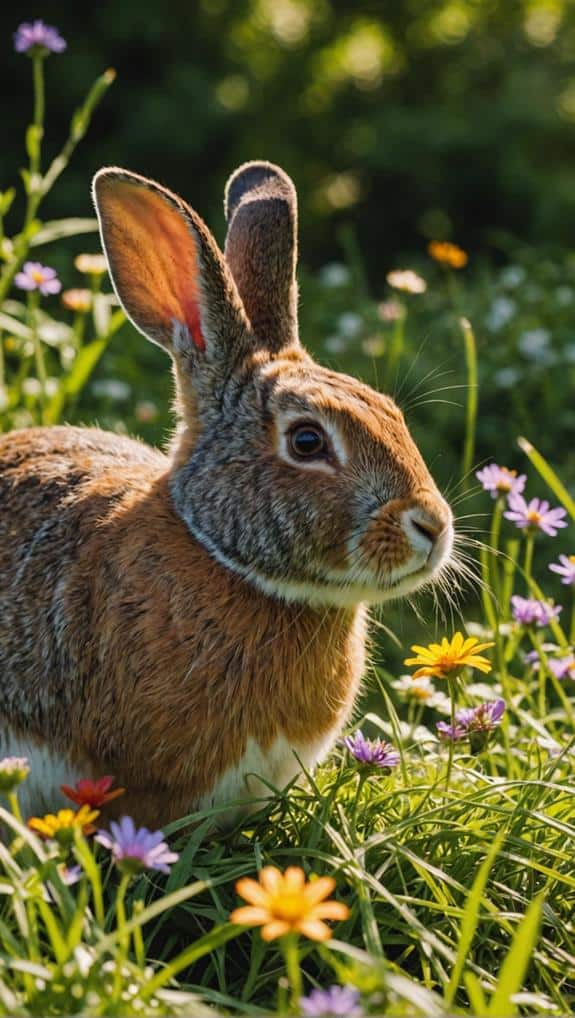
Providing high-fiber hay is essential for your senior rabbit's dental health and digestive system support.
The abrasive texture of hay helps wear down their teeth, preventing painful dental issues that often arise with age. Additionally, a fiber-rich diet promotes healthy digestion, reducing the risk of gastrointestinal problems that can severely impact their well-being.
Dental Health Benefits
For senior rabbits, a diet rich in high-fiber hay, such as Timothy or orchard grass, plays an essential role in maintaining dental health. High-fiber hay promotes proper dental wear, preventing dental problems like overgrown teeth and malocclusion.
As your rabbit ages, the risk of dental disease and pain increases, which can severely impact their quality of life. Chewing on high-fiber hay stimulates saliva production, neutralizing acids in the mouth and reducing the likelihood of dental decay.
While it's important to provide the necessary fiber, consider offering softer hays, like 3rd cutting Timothy, which are easier for senior rabbits to chew yet still maintain the required fiber content.
Moreover, a consistent intake of high-fiber hay supports a healthy gut and aids digestion, helping to reduce gastrointestinal issues that can exacerbate dental problems in aging rabbits.
By prioritizing high-fiber hay in your senior rabbit's diet, you can assure they enjoy better dental health, ultimately leading to a happier and healthier life.
Digestive System Support
A senior rabbit's digestive system relies heavily on high-fiber hay to function efficiently, making it a cornerstone of their diet. This essential component not only aids in digestion but also helps prevent common gastrointestinal issues that many older rabbits face.
- Supports healthy gut motility
- Prevents gastrointestinal stasis
- Promotes dental health through chewing
- Guarantees ideal nutrient absorption
Timothy hay, orchard grass, and meadow hay are excellent sources of fiber, fundamental for maintaining proper digestion. Unlimited access to fresh, high-fiber hay allows senior rabbits to naturally wear down their teeth, preventing dental problems.
It's important to monitor your rabbit's hay intake; if they become selective or decrease their consumption, it may indicate underlying health issues that require a vet's attention.
Additionally, the quality of hay matters greatly. Always verify the hay is free from mold and contaminants to safeguard your rabbit's overall health.
Pellet Recommendations for Seniors
Senior rabbits often thrive on a carefully balanced pellet diet designed specifically for their nutritional needs. A high-quality option, like Oxbow Essentials Senior Rabbit Food, provides increased protein and fiber to support muscle maintenance and digestive health.
Making sure your rabbit receives the right amount of pellets is essential; measure servings based on their weight—1/4 cup for rabbits weighing 1-4 lbs, and up to 1 1/4 cups for those over 10 lbs—while offering unlimited fresh grass hay.
Look for specially formulated senior pellets that include beneficial ingredients such as ginger, turmeric, and natural antioxidants, which can enhance wellness and combat age-related health issues.
When introducing new pellets, do so gradually to avoid upsetting your rabbit's digestive system.
Regularly assess your senior rabbit's weight, activity level, and overall health, adjusting pellet portions as necessary. It's always wise to consult with a veterinarian for personalized dietary guidelines tailored to your rabbit's specific needs.
Hydration and Its Importance
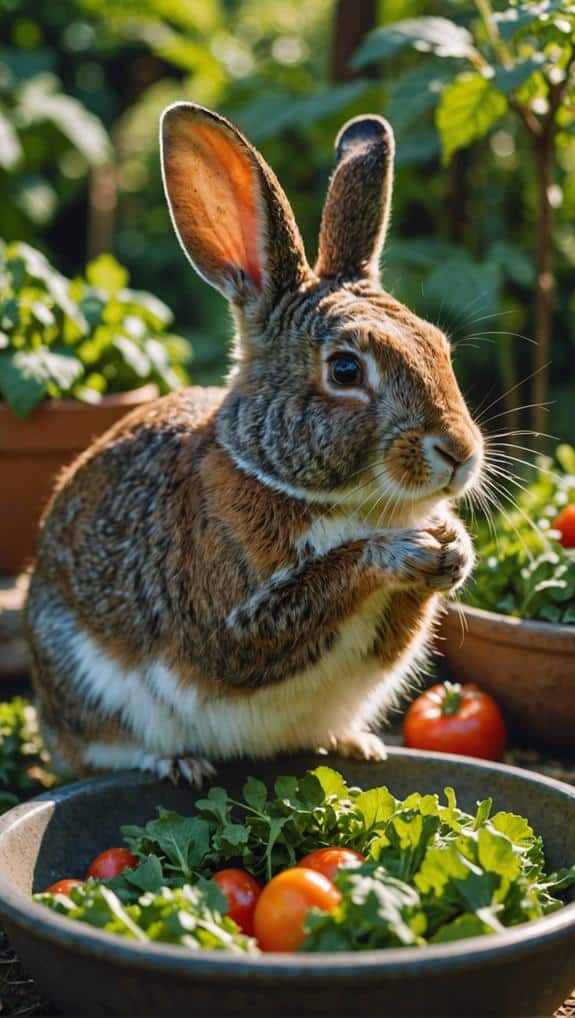
Maintaining proper hydration is essential for elderly rabbits, as even slight dehydration can lead to serious health complications, including kidney failure.
Senior rabbits are particularly vulnerable, so ensuring they've continuous access to fresh water is important.
Here are some key points to take into account:
- Provide both water bowls and bottles to cater to your rabbit's preferences.
- Incorporate wet greens into their diet to boost fluid intake.
- Regularly monitor their water consumption to detect signs of dehydration.
- Schedule routine veterinary check-ups that include hydration assessments.
Dehydration can be tricky to spot, so keep an eye out for symptoms like dry mucous membranes or lethargy.
By prioritizing hydration, you not only enhance your senior rabbit's overall health but also help prevent potential health issues that arise from inadequate fluid intake.
Regular health evaluations at the vet should include discussions about hydration levels, ensuring your furry companion remains healthy and vibrant.
Remember, adequate hydration supports essential bodily functions, contributing to a better quality of life for your beloved senior rabbit.
Take the proactive steps needed to keep them hydrated and thriving!
Monitoring Health and Diet
Monitoring your rabbit's health and diet is essential as they age, guaranteeing they receive the appropriate care tailored to their changing needs. Regular vet check-ups are critical for senior rabbits, allowing you to detect early signs of age-related issues and adjust their diet accordingly. Considerable changes in weight, eating habits, or behavior can signal underlying health problems, necessitating immediate dietary adjustments or veterinary intervention.
A high-fiber diet, primarily composed of fresh hay, is fundamental for maintaining digestive health in senior rabbits. Supplement this with specially formulated pellets that meet their unique nutritional requirements.
Introduce new foods, such as fresh vegetables or specialized pellets, slowly to monitor food tolerance and avoid digestive upset.
Additionally, be vigilant for physical signs of aging, like changes in fur quality or mobility. Regular health monitoring helps guarantee that you can proactively make dietary adjustments that support your rabbit's overall well-being.
Supplements for Senior Rabbits
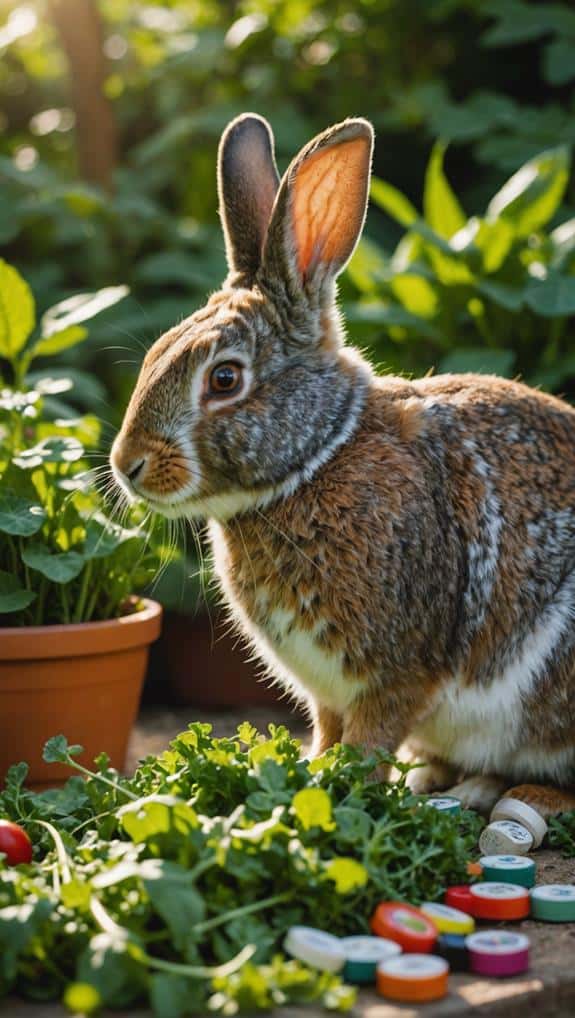
How can you guarantee your senior rabbit receives all the fundamental nutrients they need? As your rabbit ages, their dietary requirements shift, making it essential to reflect on supplements that can enhance their overall health.
Supplements can fill nutritional gaps, providing critical vitamins and minerals, especially during times of stress or illness.
- Joint support: Glucosamine and chondroitin can alleviate age-related stiffness and discomfort.
- Digestive support: Probiotics help maintain a healthy gut flora, crucial for rabbits prone to gastrointestinal issues.
- Urinary support: Certain supplements can promote urinary tract health, particularly important for senior rabbits at risk of urinary problems.
- Veterinarian consultation: Always consult your veterinarian before adding supplements to guarantee they meet your rabbit's specific health needs.
Final Thoughts
In nurturing your senior rabbit, think of their diet as a gentle embrace, cradling their health and essence. By prioritizing high-fiber hay, tailored pellets, and fresh veggies, you're planting seeds for a flourishing life. Keep an eye on their hydration and monitor any changes, as these are whispers of their evolving needs. With regular check-ups and thoughtful adjustments, you'll guide your furry companion through their golden years, ensuring their journey is filled with comfort and joy.


